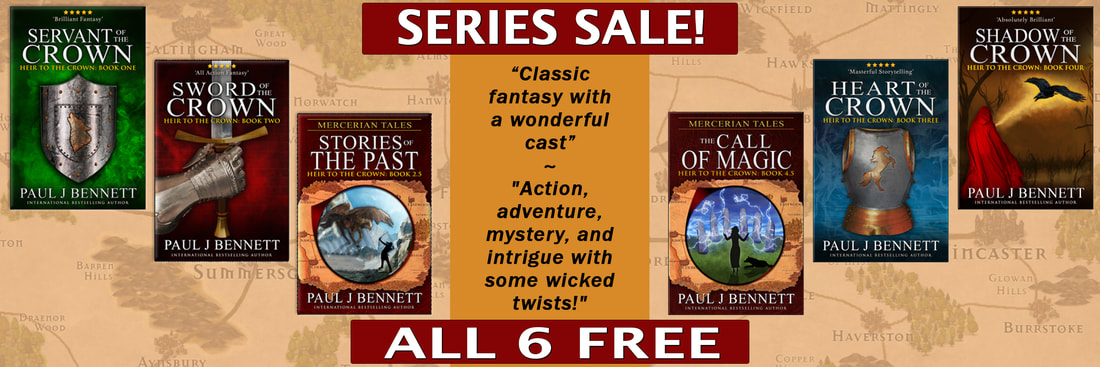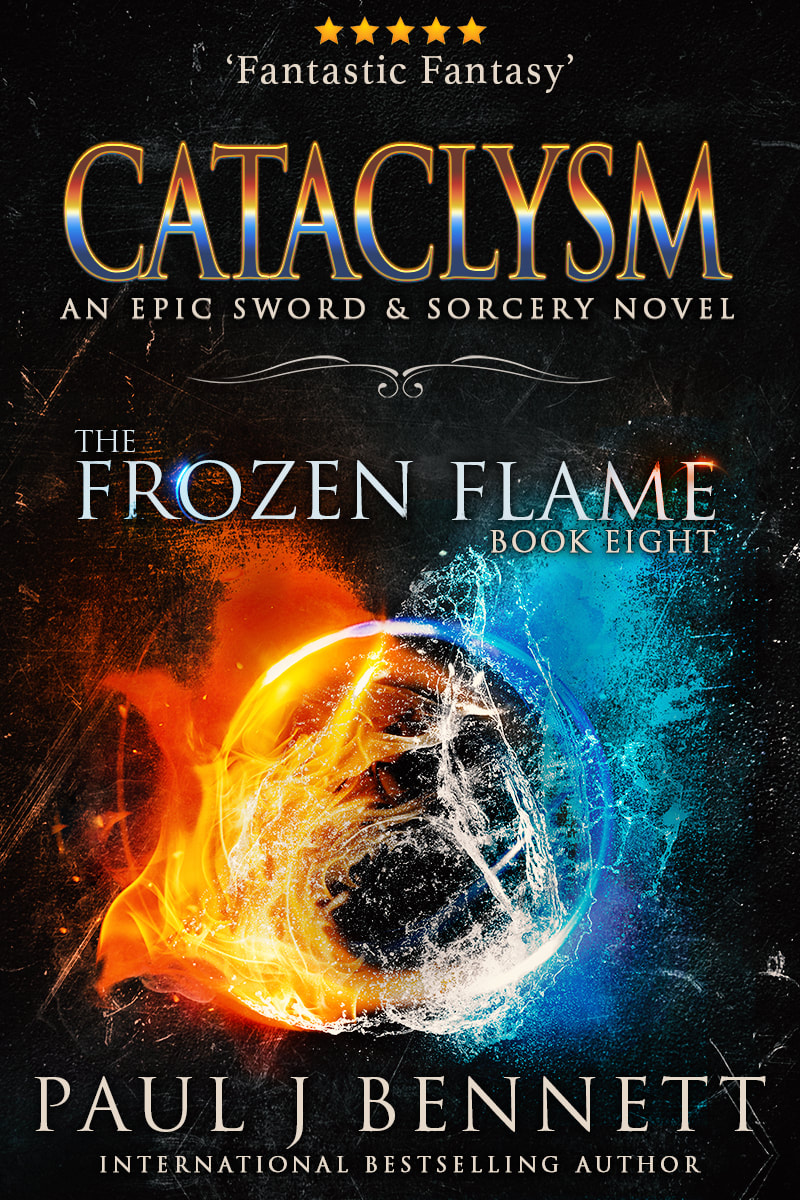|
I’m pleased to announce that Mercerian Tales: The Spark of Change is now available to dive into!
Glisnak, a Goblin first introduced in Guardian of the Crown, is returning home to tell of his adventures when… Well, I best not say too much for fear of spoiling the story. This is the sixth installment of my Mercerian Tales, stories that deepen the lore of the world of Eiddenwerthe. Although they can be read at any time, you will get more out of them if you read them in their numerical order within the series. Mercerian Tales: The Spark of Change reveals how one Goblin’s vision has repercussions that span the breadth of Eiddenwerthe. If you want to learn more about Goblins, this book is for you! Until next time, Let the adventure begin!
0 Comments
While writing Cataclysm, I was fully aware I would soon be writing another series continuing the escapades of Agar and Oswyn. As such, I planted a few interesting ‘plot points’ into the story that I intend to expand on in the future.
As someone who enjoys history, I know that nothing ever truly ends. A prime example of this is World War Two. The Axis Powers might have been defeated, but the war also sowed the seeds of the Cold War. In this vein, I also left some political issues unresolved at the end of The Frozen Flame to illustrate that nothing is ever truly finished. Which of these threads will I pull on in future series? I’m not going to say, firstly, because I don’t want to give any spoilers, and secondly, because I haven’t decided which ones I’ll use. In the meantime, you can rest assured they are bubbling inside my head. I'm pleased to announce Cataclysm is now available, making The Frozen Flame my first complete series. It’s been a long journey for Athgar and Natalia, and while the series was originally only going to be four books, the characters had other ideas.
The Frozen Flame series has two main story arcs. The first tells of the rebirth of the ancient kingdom of Therengia, while the second deals with them attempting to thwart the power and influence of the great Stormwinds family. While their story is now complete, they will show up again, although in a more supporting role. We recently adopted a rescue dog named Hazel. She’s a one-year-old Basset Hound mix, and when I say mix, what I really mean is we have no idea what the rest of her is. She definitely has a Basset head but a body that seems more like a Dachshund.
She's kept us busy of late. A Basset is supposed to be a relaxed breed, but it seems she’s unaware of that fact. Instead, we have a rather enthusiastic pup who wants to know the ins and outs of everything we do. On the upside, we get in a lot more exercise, but it also means that by the end of the day, we’re as tired as she is. And Tilly? She’s finally adjusting to having a new dog in the house, although she might prefer to have a little sister who is a tad less active. I’m sure it won’t be long before they’re best friends. Until next time, Happy reading! Warrior Prince currently sits at just over 32,000, or, to put it another way, ten chapters complete. According to our publishing calendar, I’m right on schedule. (Or should I say ‘write’ on schedule?)
I always find it tricky to start a new book in a series. This has nothing to do with the plot; it’s trying to find the best way to begin. The opening scene in a story is important as it sets the tone, and if it’s a later book in a series, it needs to gently remind the reader of where they are in the overall story. This becomes readily apparent when watching a new season of a TV series that you’ve been waiting a year for. It also happens to be why they have those ‘previously on…’ clips at the beginning. Of course, it’s a little difficult to do that in a book, so we, as authors, must come up with more inventive solutions. To celebrate the release of Enemy of the Crown, the first six books of my Heir to the Crown series are FREE for a limited time. Enjoy the first four main books in the series, along with two of the side stories. Start with Servant of the Crown from your favourite retailer here.
My latest book, Enemy of the Crown, was released on Thursday, August 24.
Merceria faces its most dangerous foe yet in the twelfth book in the Heir to the Crown series. While it primarily focuses on Merceria’s reaction to the imminent invasion, it also tells the story from the viewpoint of the Halvarians, finally revealing how the empire is structured. And yes, these are the same Halvarians who’ve threatened the Petty Kingdoms for years. And we can't forget Beverly, Aubrey, and Aldwin, who've found themselves stranded in a foreign land. Enemy of the Crown sets the stage for the largest conflict in the history of Eiddenwerthe! The story continues in Peril of the Crown, coming June 2024 Grab your copy here Peace is impossible while the family survives!
As the Northern Alliance threatens the Stormwind's power, the family retaliates, forcing the rulers of the Petty Kingdoms to bend to their will. Hoping to finally end the family’s influence, Athgar and Natalia travel to Abelard for a secret meeting, striking a deal for the future of Therengia. With a bold plan to destroy the Volstrum, they must cross Zaran, where the brave vanish and the foolhardy lose their minds. Is there truth in the stories of dangerous beasts, or are they just tales meant to frighten children? Struggling through the wilderness, with danger threatening at every turn, they seek solace in the knowledge that their sacrifice will lead to a future without strife. Only when they discover a secret long lost to the annals of history do they see a beacon of hope. The end is coming—a titanic clash of the most powerful mages on the Continent. Witness the ultimate confrontation in Cataclysm, Paul J Bennett’s epic conclusion to The Frozen Flame series. Enemy of the Crown's current word count is 60,000, which is roughly fifty percent complete. I’m presently right in the middle of writing chapter twenty and will be finished with the second act in a couple of days.
The story is pretty much sticking to the outline, with the characters where they’re supposed to be (for the moment!). The stakes have just been raised regarding the overall plot, but I can’t give you any more details without spoilers. Sorry, not sorry. Suffice it to say that I’m on track, schedule-wise, to be finished writing before the end of July, then I'll be starting on Warrior Prince, book six in the Power Ascending series. Enemy of the Crown, the twelfth main book in the Heir to the Crown series, is proceeding nicely, already sitting at a word count of 33,500, and I’m almost done writing chapter eleven.
My estimated length of this book is 120,000, and the outline includes thirty-six chapters. That means chapter twelve would mark the end of the first act (which it does according to my outline), although my word count may be just shy of 40,000 by that time. I’m not too worried, though. There are already indications I may be adding a chapter or two, as the characters are providing some twists of their own. |
AuthorPaul Bennett, Writer of Epic Fantasy Adventures. Archives
May 2024
Categories |


 RSS Feed
RSS Feed